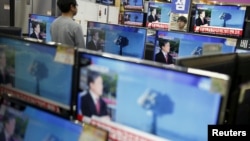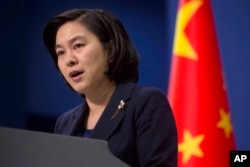North Korea’s key diplomatic ally China has voiced firm opposition to what Pyongyang said was its first hydrogen bomb test Wednesday. Beijing said it will lodge a formal protest and has called on its northern neighbor to give up on its ambitions for nuclear weapons.
Analysts said that while China is likely to take some measures to cut off North Korea to highlight its displeasure, there are limits to what Beijing can do, even when North Korea is acting out right on its door step.
The blast registered 4.9 on the Richter scale, according to China’s Earthquake Administration, and shook towns just across the border in the northeastern province of Jilin. State media reported that at least one high school was evacuated after cracks appeared on its playground.
Online criticism targets Kim
The test, which occurred just over 100 kilometers from the Chinese border, also sparked sharp rebukes online, with some calling for action and others voicing concern. On Sina Weibo, China's version of Twitter, many criticized Kim Jung Un’s decision to carry out the country’s fourth nuclear test, referring to him by his Chinese nickname “Fatty Kim the Third."
One user said it was "time for China and South Korea to work together and wipe out the regime of Fatty Kim. A scourge of humanity." Another lamented: "can't you just reform and open up [to the world]?"
The backlash was piling up on Chinese news websites as well.
One user in Sichuan wrote: "the one who should be upset the most about this are Chinese authorities." Another in Hangzhou ominously remarked: "if this tumor is not removed, it could threaten all mankind."
Lu Chao, a political scientist at the Liaoning Academy of Social Sciences, said the strong response online was understandable, adding that Chinese authorities would not tolerate Pyongyang causing trouble right on its doorstep.
“The test will have a severely negative impact on relations in the Korean Peninsula, Northeast Asia and between China and North Korea. This was a very irrational and dangerous move," Lu said, adding that it is likely Beijing would again institute some sanctions such as cutting back on food, fuel and trade ties to put the squeeze on Pyongyang, as it has done in the past following nuclear tests.
Likely repercussions
But most of the measures are likely to be largely cosmetic, said Xie Yanmei, a senior analyst of Northeast Asia at the International Crisis Group.
“China could likely cut back on economic exchanges and maybe food assistance to send signals of its displeasure and disapproval to North Korea, but not too much, for fear that those measures could destabilize the regime,” Xie said.
Xie added that Beijing is unlikely to completely abandon North Korea because it fears both the chaos and expansion of U.S. influence in the region that such a move could bring.
Beijing worries that if it completely removes its support of Pyongyang that could lead to the collapse of the regime, which could bring chaos to the region and could lead to a unified Korea - which is widely assumed would lead to an expansion of U.S. influence on the peninsula.
“A nuclear armed North Korea is uncomfortable to China, but having Washington’s presence right next door is outright frightening [to Beijing],” Xie said.






